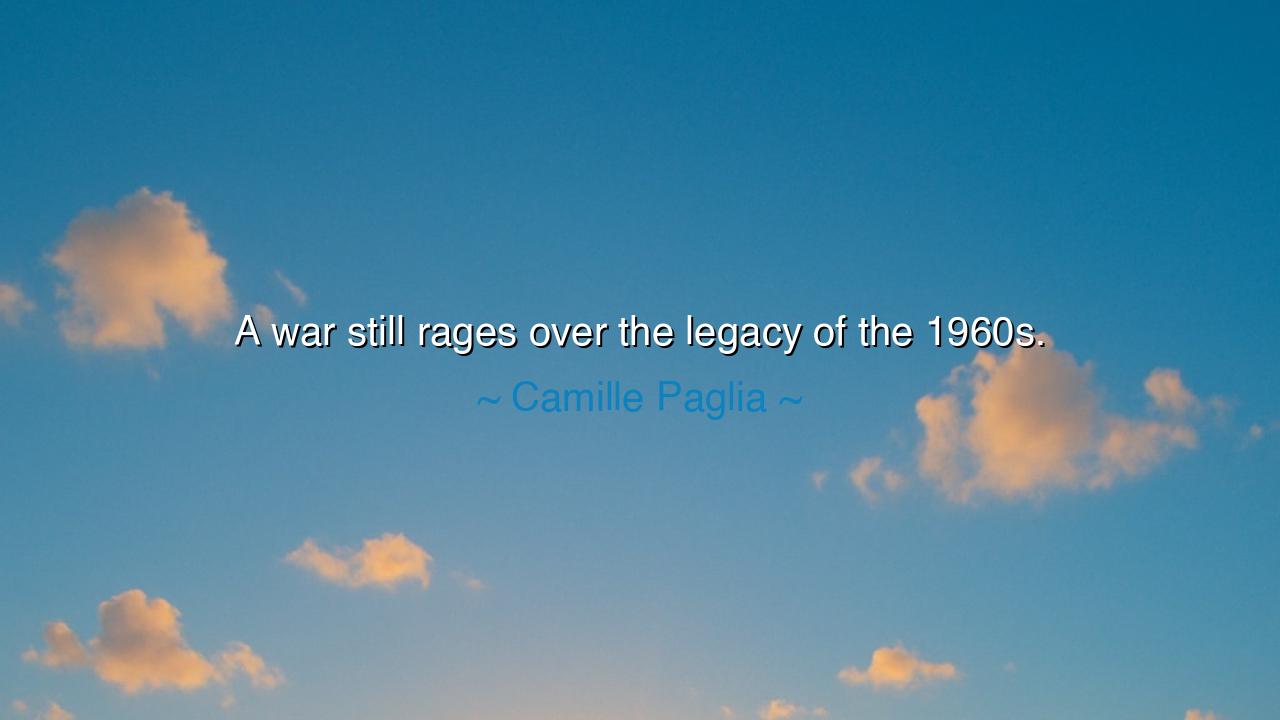
A war still rages over the legacy of the 1960s.






In the penetrating and reflective words of Camille Paglia, one of the most fearless cultural critics of our time, we hear a truth that still trembles beneath the surface of modern life: “A war still rages over the legacy of the 1960s.” These words are not mere commentary—they are prophecy. They remind us that history does not end when the decade closes or the music fades. The battles of the past echo through the corridors of the present, shaping our beliefs, our politics, and even our souls. What Paglia calls a “war” is not fought with weapons, but with ideas, values, and visions of freedom. It is a struggle over memory itself—over what the 1960s meant, and what they still mean today.
The origin of this quote lies in Paglia’s reflections on the cultural and political upheavals of the twentieth century, particularly in her essays and interviews where she analyzes the spirit of the 1960s—an age of rebellion, innovation, and transformation. The world that emerged from that decade was profoundly changed. The civil rights movement, the rise of feminism, the antiwar protests, the sexual revolution, and the explosion of art and counterculture—all were waves in a storm that sought to reshape the moral and social order of the world. To some, it was a golden age of liberation; to others, it was an age of chaos and decline. Paglia saw that even decades later, the world had not yet resolved what the 1960s had begun. Hence her words: the war is not over—it lives on in the very fabric of modern thought.
To say that “a war still rages” is to recognize that the conflicts of ideology and identity that emerged in that decade have never ceased. The 1960s challenged authority and questioned every foundation—political, sexual, spiritual, and artistic. The youth of that age rejected the traditions of their parents and sought a world without hypocrisy or constraint. Yet in doing so, they created a legacy that remains contested. Were they heroes who expanded the boundaries of human freedom? Or were they dreamers whose revolutions gave rise to new forms of excess and confusion? Paglia’s statement captures this eternal tug-of-war—a battle between those who revere the 1960s as an awakening and those who see it as a fracture from which society has never fully healed.
Consider the story of 1968, a year that seemed to contain the century’s every sorrow and triumph. In the United States, Martin Luther King Jr. and Robert F. Kennedy were assassinated, their deaths casting shadows over the movements they led. Across the ocean, students in Paris and Prague rose up in protest, demanding freedom from old regimes. Music, art, and literature pulsed with defiance and possibility—Woodstock and the songs of Dylan, the poetry of Ginsberg, the art of Warhol. It was an age ablaze with vision, but also consumed by turmoil. From those fires, modern culture was born—but the ashes still smolder. The arguments begun in that time—over freedom and morality, gender and race, faith and reason—still divide us today.
Paglia’s insight is that this war is not just political—it is spiritual. The 1960s unleashed a hunger for authenticity and individuality that both ennobled and destabilized the human spirit. Old hierarchies fell, but new uncertainties arose. In freeing the self, humanity also discovered the loneliness of that freedom. The reverence for nature, art, and sexuality that blossomed in that era gave rise to both beauty and decadence. The tension between those who seek order and those who seek liberation is the same battle that raged in the 1960s—and it rages still, in our universities, in our homes, and in our very hearts.
But Paglia’s tone is not one of despair; it is one of understanding. She calls us to see that this war over the past is a sign of the present’s vitality. The fact that we still argue over the 1960s means that its questions remain alive—questions about what it means to be human, to be free, to belong. Each generation must return to these questions and answer them anew. The “storm” of the 1960s, she suggests, was not a mistake but a test—a challenge that forced civilization to confront its contradictions. And though the battle has yet to be won, the struggle itself has kept our societies alive and thinking.
So, my children, take this teaching to heart: every age inherits the unfinished battles of the last. Do not fear them, nor flee from them. Engage with them, as thinkers and as builders. Study the 1960s not as a relic, but as a mirror reflecting your own time. Ask yourselves: What are the freedoms worth keeping? What are the values worth restoring? Do not be seduced by nostalgia, nor blinded by rebellion. Walk the middle path—honor the past, but dare to think anew. For history’s greatest wars are not fought on battlefields, but in the realm of ideas, and those who face them with honesty and wisdom become the architects of the future.
In the end, Camille Paglia’s words remind us that the war over meaning—the war over truth—never ends. But it is through such struggle that humanity grows. Let us, then, fight not with hatred, but with understanding; not to destroy, but to illuminate. For if the 1960s taught us anything, it is that the soul of civilization must be continually reborn in the fire of questioning—and that the peace we seek lies not in silence, but in the courage to keep asking what kind of world we wish to bequeath to those who come after us.






AAdministratorAdministrator
Welcome, honored guests. Please leave a comment, we will respond soon